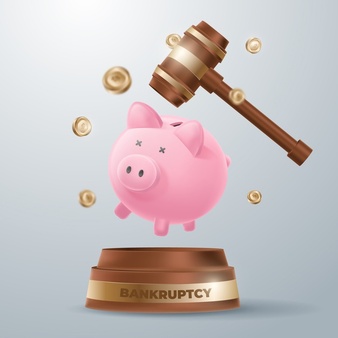Are you having trouble paying your bills to your creditor? Are you worried about losing your home or your car? Are you facing hardship due to overwhelming debt? Trying to overcome financial problems can cause stress and anxiety. Many debtors face a financial crisis at some point in their lives. Fortunately, there are several debt relief options available to help you rebuild your finances, one of which is Chapter 7 bankruptcy. A reliable Phoenix bankruptcy lawyer can help you determine whether you are eligible to file for bankruptcy Chapter 7.
Among the different types of bankruptcy, Chapter 7 bankruptcy is considered the most powerful and quickest option to wipe out debts and pursue debt settlement. It gives you a fresh start by eliminating your debts and allowing you to reorganize your finances. It involves the process of liquidation of assets to pay off your creditors. If you file Chapter 7, your bankruptcy trustee will be responsible for selling your non-exempt properties. The proceeds will be allocated to your creditors based on the payment plan. However, filing bankruptcy Chapter 7 doesn’t necessarily work for everyone. There are certain requirements that you need to meet before you qualify for this chapter. You need to check if you can meet the income requirements through a “means test” and if you can protect your assets using bankruptcy exemptions.
Before you file bankruptcy, it is important to understand both the benefits and consequences. Aside from the known advantages of Chapter 7 bankruptcy, this article will explain the possible outcomes and effects of filing this chapter. Here are some of the questions that you might have in mind:
- How Long Does Chapter 7 Stay on the Credit Report?
- How Do I Rebuild My Credit Score After Bankruptcy?
- What is the Role of a Bankruptcy Attorney?
How Long Does Chapter 7 Stay on the Credit Report?
 Declaring bankruptcy can be your last resort to help you pay off your debts and start over with a clean slate. Everyone wants to remain debt-free after receiving a bankruptcy discharge for credit card bills, medical bills, and other qualifying debts in Chapter 7 bankruptcy. However, you may wonder about the impact of the bankruptcy filing on your credit.
Declaring bankruptcy can be your last resort to help you pay off your debts and start over with a clean slate. Everyone wants to remain debt-free after receiving a bankruptcy discharge for credit card bills, medical bills, and other qualifying debts in Chapter 7 bankruptcy. However, you may wonder about the impact of the bankruptcy filing on your credit.
According to the Fair Credit Reporting Act (FCRA), a Chapter 7 bankruptcy can remain on your credit history for up to 10 years from the date the bankruptcy was filed. You don’t need to do anything to have a bankruptcy removed from your credit report. After the allotted ten years, the bankruptcy and any included accounts will automatically be removed from your credit report.
How Do I Rebuild My Credit Score After Bankruptcy?
The impact of bankruptcy on a credit report can be devastating and it entirely depends on your credit score before filing. The effect of bankruptcy in your credit report will gradually fade with time as you think of ways on how to improve your credit score. A qualified Phoenix bankruptcy lawyer can help you begin restoring your creditworthiness one step at a time. Here are some tips on how to improve your credit score after Chapter 7 bankruptcy:
Stick to a Budget
The first step toward taking control of your financial situation is to do a realistic assessment of the amount of money you earn and compare it to the amount of money you spend. You can start rebuilding your credit by reviewing your spending habits and stay within a reasonable budget. Re-evaluate your finances and see where you can cut expenses and save more money if you can. You need to avoid purchasing unnecessary items that you can’t afford to pay for in cash.
Always Pay Bills on Time
If you want to improve your credit score, you need to do your best to pay all your bills or any existing credit lines on time every month. Avoid falling behind on any accounts. If you have any past-due accounts, bring them current and continuously make on-time monthly payments. Some creditors hire collection agencies to follow up on unpaid customer accounts. If one of your accounts goes to collections, it will be reported to the credit bureaus and can damage the progress that you’ve made.
You may also consider setting up automatic payments or payment reminders to help ensure you aren’t ever late with a payment. Keep in mind that your payment history is the most important factor for rebuilding your credit. All the details of your payment such as on-time, late, or missed payments will reflect on your credit history.
Use a Secured Credit Card
If you have closed all your previous credit card accounts, you can start over by applying for a new secured credit card. However, be cautious of credit cards that might have low limits, high-interest rates, and high annual fees. Before you sign up for a new credit card, it is important to review the terms carefully.
If you don’t qualify for a typical, unsecured credit card, you might want to start rebuilding your credit by getting a secured credit card from your bank. A secured credit card is a type of credit card that is backed by a cash deposit from the cardholder. This deposit acts as collateral, providing the card issuer with security in case you fail to make monthly payments. The amount of your deposit is usually your credit limit.
With a secured card, you give the bank a certain amount of money as a deposit in exchange for a credit card you can use to make purchases. You have to make sure that your card issuer will report your monthly payments to all the major credit-reporting bureaus.
Monitor Your Credit Report
You must ensure that your credit report is accurate and free from errors. If you notice any incorrect information on your credit report, you must correct all errors with your creditors and credit reporting agencies, which could help your bad credit improve. It is important to take a copy of your credit reports from any of the three major credit reporting bureaus – Experian, TransUnion, and Equifax – to be able to monitor them regularly.
What is the Role of a Bankruptcy Attorney?
Filing for bankruptcy is a major decision. It has a big impact on your credit profile and it can hurt your credit score. However, you don’t have to worry since its effects won’t last forever. Though you can’t do anything about the amount of time bankruptcy remains on your credit report, you can take small steps that will gradually improve your credit score. The only way to begin rebuilding credit is to be responsible enough in handling your finances. For legal help in rebuilding your credit after bankruptcy, do not hesitate to schedule a consultation with our competent Phoenix bankruptcy lawyers at Phoenix Fresh Start Bankruptcy. Our bankruptcy law firm will help you choose the best credit repair strategies that will fix your credit and maintain a good credit score after your bankruptcy discharge.




